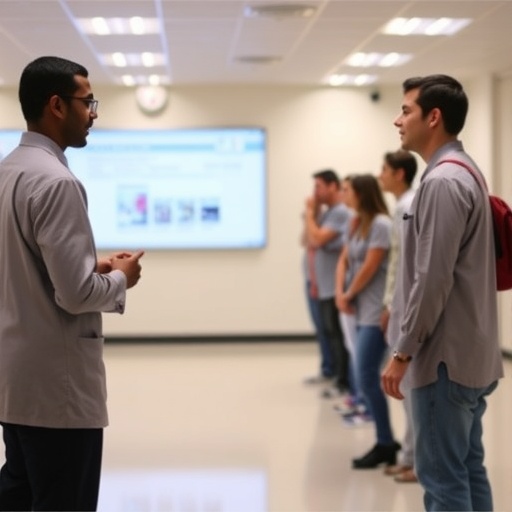The path to becoming a physician is complex and multifaceted, particularly during the formative years of medical education. A qualitative study published in Discov Educ addresses a critical but often overlooked aspect of this journey: the motivations that propel first-year medical students toward their chosen careers. The research by St. Louis, Pasquantonio-Pierce, and Hill unravels intrinsic, extrinsic, and interpersonal factors that serve as essential motivators during this pivotal period in medical training.
Understanding the motivation behind a medical career begins with acknowledging the variety of influences that prospective students encounter before entering medical school. Intrinsic motivation is often fueled by a passion for science and a deep desire to help others, which can emerge from personal experiences and social interactions. The study explores how the personal motivations of students can cultivate a commitment to medicine from a young age. Respondents in the study articulated experiences that lit the spark of interest in medical fields, including early interactions with healthcare professionals and personal encounters with illness.
However, intrinsic motivation alone does not provide a complete picture. The role of extrinsic motivators, such as societal expectations and financial considerations, also plays a significant part. In an era where the cost of medical education is soaring, student debt regularly weighs heavily on candidates’ career choices. The study highlights how these pressures can influence students’ decisions, sometimes aligning them with specialties that promise higher financial rewards rather than those that align with their deeper interests.
Interpersonal communication, including feedback from peers, mentors, and family, cannot be understated in shaping medical students’ career decisions. The findings signal that relationships with mentors in medical practice often inspire students to continue on their chosen path. Many subjects cited influential figures who provided insight into the day-to-day realities of being a physician, which highlighted the human side of the profession and solidified their desire to pursue medicine.
Additionally, the qualitative approach of the study allows for a robust exploration of these motivators. Interviews and focus groups reveal emotional narratives that data alone cannot encapsulate. For instance, students shared personal stories of loss or illness that drove their passion for medicine, illustrating how deeply emotional experiences can intertwine with career choice. This qualitative granularity helps educators and policymakers understand more about the human side of medical training and what can be done to foster motivation.
As the study aims to illuminate the intricacies of motivation for future physicians, it also raises critical questions about the structure of medical education itself. How well do current curricula align with students’ intrinsic motivations? Are there sufficient systems in place that nurture students’ passions instead of suppressing them? Responses from the study suggest that while medical training is designed to create competent healthcare providers, it may not always consider the individual motivations and aspirations that each student brings to their studies.
In light of these findings, medical schools may benefit from reevaluating their admission and educational processes. Rather than solely focusing on academic performance, institutions could consider a more holistic approach that values diverse experiences and motivations. Emphasizing a supportive environment that encourages personal and professional growth can help retain students who are genuinely passionate about medicine—not just those who score high on standardized tests.
Moreover, as the healthcare landscape continues to evolve, the motivations of incoming medical students will likely shift as well. Understanding these trends is crucial for institutions seeking to evolve alongside the needs of healthcare systems and patient populations. By engaging with students and soliciting their views on what drives them, schools can adapt their programs to better attract and retain future doctors who will be responsive to the changing dynamics of healthcare.
This study’s findings also evoke a broader conversation about the role of medical practitioners in society. If the motivations to pursue medicine are shaped by personal experiences and social influences, the future of healthcare hinges on creating environments where empathy and compassion are prioritized. There is an increasing need for the healthcare community to reflect on its values and to ensure that incoming generations of physicians are not just skilled but also deeply connected to the humanity underlying their work.
Furthermore, the implications of these insights extend beyond medical training. By understanding the intrinsic, extrinsic, and interpersonal motivators behind students’ decisions, we can better anticipate how future healthcare professionals will approach their careers. Will they prioritize patient care, research, policy change, or public health? As healthcare continues to grapple with complex challenges, the motivations that drive students today will shape the responses they provide in their practices tomorrow.
Ultimately, shedding light on the factors that influence the career choices of medical students serves to strengthen the healthcare system as a whole. By fostering a generation of physicians who are not only knowledgeable but also motivated by intrinsic values of service and empathy, we can cultivate a healthcare environment that is deeply attuned to the needs of patients and communities. The study’s findings underscore the importance of individual experiences and the need to support diverse motivations within medical education.
In conclusion, understanding the motivations influencing first-year medical students is critical for the future of medicine. The blend of intrinsic passions, extrinsic expectations, and interpersonal relationships form a complex web that dictates their career trajectories. Institutions must listen and adapt to these narratives, ensuring the next generation of healthcare providers is not only competent but also compassionate, continuously striving to improve the quality and accessibility of patient care.
Subject of Research: Early experiences influencing career choice for medicine among first-year medical students.
Article Title: Early experiences as intrinsic, extrinsic, and interpersonal motivators that influence first year medical school students’ career choice for medicine: a qualitative study.
Article References:
St. Louis, J., Pasquantonio-Pierce, M., Hill, E.V. et al. Early experiences as intrinsic, extrinsic, and interpersonal motivators that influence first year medical school students’ career choice for medicine: a qualitative study.
Discov Educ 4, 504 (2025). https://doi.org/10.1007/s44217-025-00765-3
Image Credits: AI Generated
DOI: https://doi.org/10.1007/s44217-025-00765-3
Keywords: Medical education, Career motivation, Intrinsic factors, Extrinsic factors, Interpersonal relationships, Healthcare profession.




